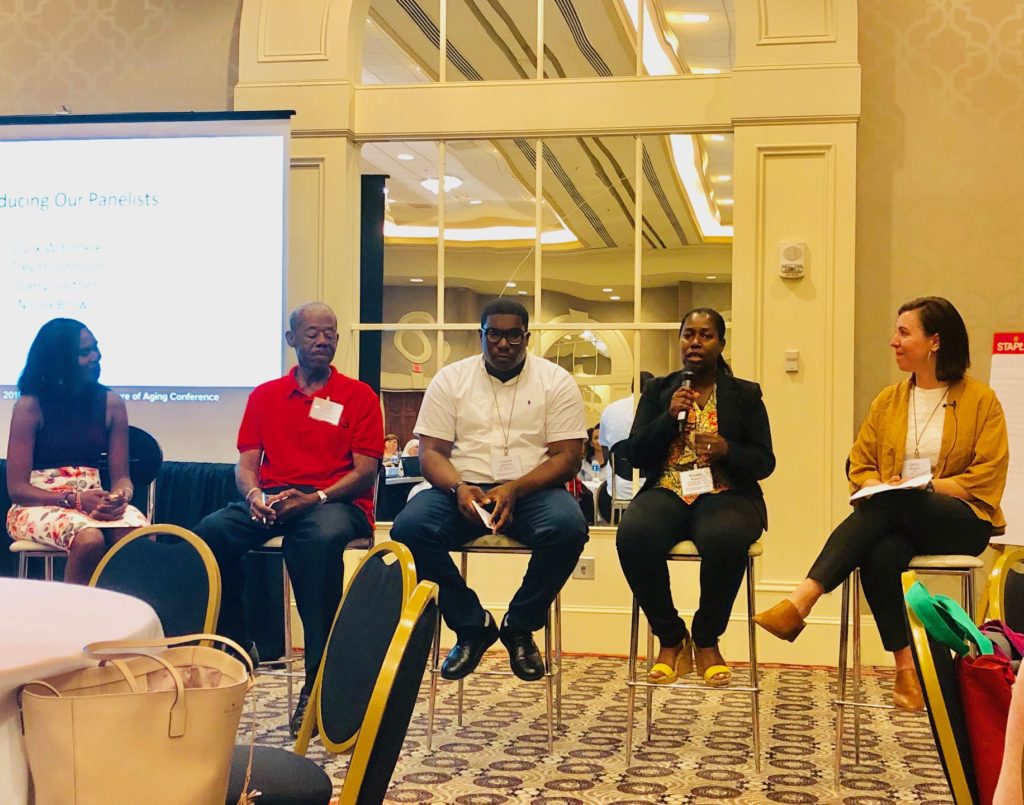Workplace Culture: What Direct Care Workers Want You to Know
In the long-term care sector, workplace culture is powerful. At its worst, it can drive direct care workers to leave their jobs, yet at its best, it can be an invaluable tool for attracting and retaining quality staff. At PHI, we believe that creating a healthy, vibrant workplace culture requires an intentional process of collaboration that centers the voices of direct care workers.
This past August at the Pioneer Network conference, I had the privilege of facilitating a panel discussion with direct care workers to learn more about their experiences with workplace culture, why they stay in these jobs, and the types of preventable barriers that might compel them to leave their jobs.
Our panel included Nicola Brown, Garry Gaither, Trevon Johnson, and Culix Wibonele. Nicola, Culix, and Trevon work for Park Springs in Stone Mountain, Georgia, and Garry works for Nazareth Home in Louisville, Kentucky. The following stories and insights are based on individual interviews with the panelists.
The full panel conversation from the Pioneer Network Conference (held on August 5, 2019) can be viewed here.
Emily Dieppa: Describe your ideal workplace. What’s important to you?
Nicola (Care Partner): I appreciate that I’m able to express emotion and be in relationship with my residents and their families. If a resident passes, I can mourn for the person I cared for, and I can mourn with their families. Life is a journey that doesn’t end when your breath stops. For me, that is important. I am allowed to honor the full cycle of life.
Garry (Environmental Services Floor Tech): I really enjoy our townhall meetings. All the staff go, and there’s a lot of input and conversation. For example, we talked about ‘natural rising.’ We usually turn the lights on at 8am, but what if we asked residents whether or not they wanted the lights on at 8am? Maybe they’d prefer to sleep later, and that’s okay. We were empowered to make changes, and I really took that to heart.
Culix (Care Partner): I used to work as a salesperson. At the end of the day, you’re only making money. It’s just a job. Being a care partner allows me to connect with people emotionally and feel gratitude from families. It’s about how I’m making people feel, not what I’m selling them.
Trevon (Home Maker): Being able to showcase my skills and talent is really important to me. Around the holidays, I have the chance to put on a show for the residents and families. I do a buffet-style dinner, and we make it feel like a real restaurant. It makes me feel good about myself, because I’m able to recreate an experience for residents and their families that we often take for granted.

From left to right: Culix Wibonele, Garry Gaither, Trevon Johnson, Nicola Brown, Emily Dieppa
ED: Tell us a story about when you felt valued by a co-worker or manager. What made that experience special?
Nicola: One morning, two people called off, and it was an emergency situation. We were able to get the residents up and cared for, because we always work as a team. My supervisor knew I had school that morning. Even though going to school is very important, taking care of my residents is more important. I felt good about it, because by the end of the day, my supervisor texted me and said, “I appreciate you, and I appreciate what you did.”
Culix: One time, my supervisor complimented my work in front of the whole staff. I thought, “Are they really talking about me?” I felt like I was floating. It was touching, and it let me know that everything I do is noticed and really does make a difference.
Garry: I’m close with one of our residents who is a younger gentleman with a physical disability. Technically, he’s non-verbal, but we talk to each other every day. One time, I went on vacation, and my supervisor set up Skype calls for me and this resident to talk to each other while I was away. I could tell they appreciated me and how I brought joy to this resident, and that meant a lot to me.
Trevon: At first, this started as a job for me. But I was told home makers are the heart of the home, and I started to really feel that. I could see that if me or my fellow home maker didn’t make it work, the community wouldn’t work right. There’s a resident who will only take her meds if I’m in the room. I know I’m needed, and I can see the difference I’m making.
ED: What could ever make you leave your job?
Culix: Being able to grow professionally and learn new things is important to me. I always want to try and do my job even better. I would leave if I felt like I didn’t have any more opportunities for growth, or if I felt like I wasn’t appreciated and heard.
Garry: I love my job at Nazareth Home. The only thing that could ever make me leave is if we stopped following the golden rule of “treating others as we’d like to be treated,” or if we got to a point where we were treating residents as an item versus a person. I enjoy being kind – it’s how I was raised, and I am grateful it’s how Nazareth Home treats its employees and residents.
Trevon: Sometimes it can be hard to please everyone. You have so many residents, plus their family members, and I always want to make sure they’re all happy and taken care of. My job isn’t just about cooking – I give a little extra. If I felt like I couldn’t be there for residents or go above and beyond, I wouldn’t want to be there.
Nicola: If I ever felt like members weren’t being cared for emotionally, I’d imagine leaving. I’m not talking about the physical aspects of care – many people can give someone a shower. I’m more concerned about emotional connection and well-being. I don’t come to work every day just to collect a paycheck. It’s my ability to impact someone’s life and how they feel in that moment that keeps me coming back.
For more information on creating a workplace culture that effectively recruits and retains quality direct care workers, check out PHI’s publication Growing a Strong Direct Care Workforce: A Recruitment and Retention Guide for Employers.






